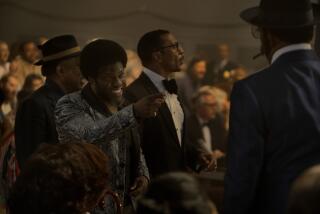The valuable take in heist films new and old
- Share via
The heist film is not evolving, at least not much, and for reasons that are not hard to point to, this is a fine thing.
A recent spate of heist movies -- the remake of “The Italian Job,” “The Good Thief” and the 2001 remake of “Ocean’s Eleven” -- sport the same conventions that defined the originals: the 1969 edition of “The Italian Job,” Jean-Pierre Melville’s archetypal 1955 “Bob le Flambeur” and 1960’s original “Ocean’s Eleven.”
Sure, there are updates here and there (most noticeably in the too forcefully contemporized “The Good Thief”). But for the most part, the heist-genre conventions are as solid and dependable as a gold ingot.
The central action in every heist flick pivots around the job to end all jobs. It is an audacious score, the kind no one would ever think of because it is almost impossible and, well, unthinkable. In both versions of “Ocean’s Eleven,” the heist involves simultaneously hitting Las Vegas casinos on a big night. In both versions of “The Italian Job,” the job is looting a safe full of gold bars. In “Bob le Flambeur” and Neil Jordan’s “The Good Thief,” it is another casino job.
Each heist requires the talents of a diverse group of old friends, a cadre of seasoned, cool-headed criminals who may or may not have seen the inside of the big house and who can be called upon to work together as seamlessly as the parts in a diamond-studded Swiss watch.
Every group has a leader, the brains of the outfit who is charismatic, steady and in love with something larger and more abstract than gold or diamonds or cold cash.
The title character in “Bob le Flambeur” embraces poetic ideals of beauty and honor and cannot be corrupted even by a wanton young woman who offers herself for free. (Part of the problem with “The Good Thief” remake was that Bob’s integrity and honor were no longer incorruptible, and it made him less interesting -- too average -- to hold the center of the film.)
Every cadre of crooks is a collection of specialists: a safe cracker, an explosives expert, a driver, a computer or alarm-systems geek and a heavy lifter.
In “Bob le Flambeur,” heist style is defined by the chain-smoking, trench-coat-sporting smooth operators typified by Roger Duchesne’s Bob. Nicotine also plays a leading role in the original “Ocean’s Eleven,” and with the exception of “The Good Thief,” whose lead character smokes throughout, it is one nod to contemporary wisdom that the remakes of most heist films show signs of kicking the habit.
The greatest concession to evolution in the heist genre may be the roles available for women. In the original round of heist films, grand scale robbery was almost always a man’s game. If women were featured at all, they were generally a hindrance. The wayward Anne in “Bob le Flambeur” turns out to be a serious liability. Ditto the babe in “The Good Thief.” Women hardly figure at all into the “Ocean’s Eleven” flicks. Women are casino scenery, drunks in the parking lot or ex-girlfriends who urge caution.
The exception is “The Italian Job.” Stella, played by Charlize Theron, is an expert safecracker, just like her dad. She also masquerades as a cable TV repairer to get valuable information. She drives a Mini Cooper with the skill of Mario Andretti.
The final heist film convention is the most important. Put to the evolutionary test in “The Good Thief,” it did not survive. This is the idea that there is honor among thieves, and it is the reason generations of audiences have gleefully cheered the morally bankrupt bad guys.
Duchesne’s Bob observes a code of conduct with the town’s gendarme, whose life he once saved. The same integrity governs his relationships with his men. In “The Italian Job” and “Ocean’s Eleven,” the enduring relationships among partners in crime are more important than whatever they happen to be stealing. The bonds of friendship and trust are the real gold. As the line goes in “Ocean’s Eleven”: “You’re either in, or you’re out.”
*
Deborah Hornblow is a staff writer at the Hartford Courant, a Tribune company.
More to Read
Only good movies
Get the Indie Focus newsletter, Mark Olsen's weekly guide to the world of cinema.
You may occasionally receive promotional content from the Los Angeles Times.










